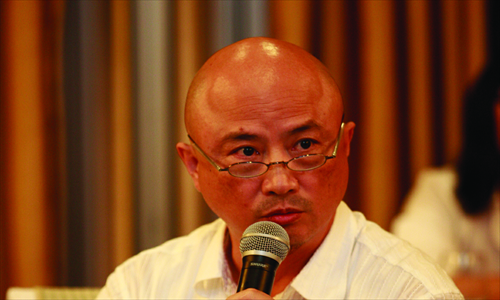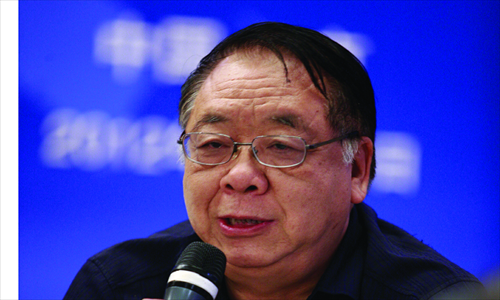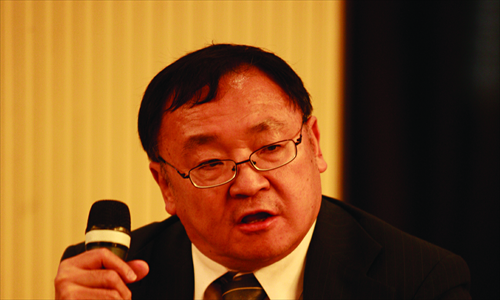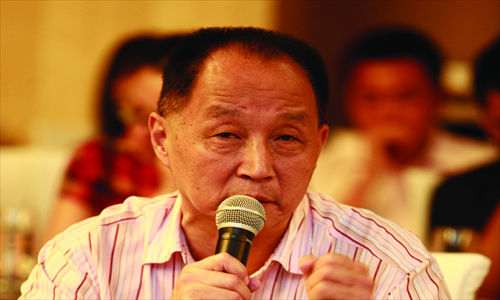Diaoyu puzzle lacks clear answers
Editor's Note:
After Japanese activists landed on the Diaoyu Islands early Sunday morning, small protests broke out in some Chinese cities. What steps should China take? Is Japan acting alone? Scholars from the mainland, Hong Kong, Macao and Taiwan held a hot discussion over these issues at a symposium on safeguarding the Diaoyu Islands held by the Global Times Sunday.
Prepare for long-term plan
Liu Gang, professor at Okinawa University

China faces several problems in tackling the Diaoyu Islands issue: Japan's actual control of the Islands, Japan's nationalism, reflected in its right wing's provocation, and the US factor.
China and Japan previously had an agreement on "shelving bilateral disputes." But Japan ignored the principle, and sought actual control of the islands step by step through unilateral actions. Now if we continue to talk about "shelving bilateral disputes," it seems that we are taken advantage of by Japan.
China's national strength is rising, which makes Japan nervous. If some day the economic connections between the countries are really cut off, I'm afraid Japan will be quite unnerved.
We do not need to get into a war with Japan, but should make preparations for a long-lasting conflict. We should force Japan to realize the necessity to sit down and talk to us.
We should also legalize the acts for protecting the islands. If the Japanese land on the islands, we could file a lawsuit against them.
We can also have escort vessels for those safeguarding the islands.
These ships can inform Japan about their arrival, so that Japan has no grounds for a collision with the Chinese ships.
Don't forget bigger picture
Ma Zhengang, former ambassador to the UK and currently policy advisor for the Chinese Ministry of Foreign Affairs

As to the Diaoyu Islands issue, one question I've been thinking of is whether it's a moment when the two neighbors should get involved in a comprehensive conflict. Last year, the trade volume between the two countries reached $344.9 billion. Some tend to ignore this, but I believe many Chinese enterprises and workers don't think in the same way. We need to see the big picture of Sino-Japanese ties.
Does it really suit China's interest if it wrangles with Japan over the Diaoyu Islands? We also have to consider the possible impact on China's domestic development.
While society is easily stirred up by the dispute, the authorities should keep a cool head and look at the bigger picture. I respect the Hong Kong activists who landed on the islands despite high risks. But as a diplomat, I have to say they need more communication with the government, so as to best safeguard the islands.
'FIRM' principle needed
Chen I-Hsin, professor of the Graduate Institute of the Americas, Tamkong University

As a Taiwanese, I want to point out that both the Chinese mainland and Taiwan need to be guided by a principle of "FIRM" over the Diaoyu Islands issue.
"F" here represents flexibility, meaning that it requires great flexibility to defend the Diaoyu Islands. The mainland, Hong Kong, Macao and Taiwan can all have their own ways to defend the Diaoyu Islands.
"I" stands for the international environment. The US is behind the Japanese, so that our target is not solely Japan. Although China's navy is relatively strong, it is still incomparable to the US navy and cannot even guarantee a victory over Japan.
"R" calls for resolution. Since taking back the Diaoyu Islands will be a prolonged process, we will need to have long-term resolution, putting efforts in education, cultural and economic development.
The last "M" represents military strength, which is built upon a strong economy.
Each aspect of the "FIRM" principle should be ensured if we want to effectively defend the Diaoyu Islands. Consistent actions are needed, although there won't be a result soon.
In-depth studies priority
Li Jie, a researcher at the Naval Research Institute in the PLA navy

Only through in-depth study of the Diaoyu Islands issue can we effectively resolve the problem.
Under an overall strategy, we should know about concrete issues at every facet, including historical, legal, cultural and even military issues. Only through more thorough, meticulous and objective studies, can we better promote the addressing of the dispute.
Besides in-depth research, what we also need is to make concrete strategic plans and establish corresponding institutions. There are plural levels of the Diaoyu Islands issue. And we need specific organizations to deal with each of these levels.
Preparations from all dimensions are needed. In the long term, different government departments should enhance collaboration.
At present, the use of maritime force in law enforcement is increasing. We should strengthen the legal framework for this.
Government action can be the next step to resolve the Diaoyu Islands issue.
Experts' Views
Xu Sen'an, a senior researcher at the State Oceanic Administration
Some propose to separate economic issues from political ones when we view the Sino-Japanese relationship. I don't agree.
Economics serves politics. Facing Japan's provocation, we should exert pressure on it economically.
Under certain circumstances, we should bring up some historical issues again, such as Okinawa, originally the Ryukyu Islands that were affiliated with China historically and later occupied by Japan. Originally most of the indigenous people were Chinese, specifically the Gaoshan minority group from Taiwan.
Peng Guangqian, a military strategist at the PLA Academy of Military Sciences
The Diaoyu Islands issue, in its essence, is a wrangle between China and the US. The tensions over the islands are closely related to the US military and strategic pivot to Asia, which has been taken advantage of by some Japanese politicians, including Tokyo Governor Shintaro Ishihara.
The Diaoyu Islands issue is also a strategic test by Washington of China.
In the future, will Japan focus more on dealing peacefully with Asia, or will it be a pawn for the US in this region? Japan is still hesitating about its self-positioning and future strategy.
Tang Chunfeng, a Japan expert and former official at the Chinese embassy in Tokyo
The Chinese media should play a bigger role. In order to mobilize Japanese public to support the government's move over the Diaoyu Islands, the Japanese media have started a propaganda campaign in a systematic, designed way.
In comparison, our media has done far from enough.
Li Wei, director of the Institute of Japanese Studies, Chinese Academy of Social Sciences
The publication work of our historical evidence over the Diaoyu Islands lags behind. According to my observations, neither researchers with the State Oceanic Administration nor scholars of modern history have published adequate related articles.
The Japanese have claimed the islands as their inherent territory, but they don't have enough evidence, and some of them oppose the claim. China has all the evidence, but we still have lots to do in exploring and using historical documents.